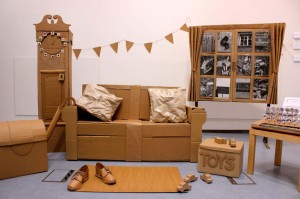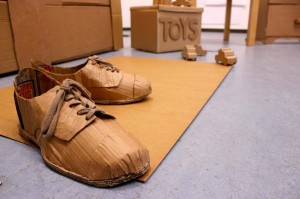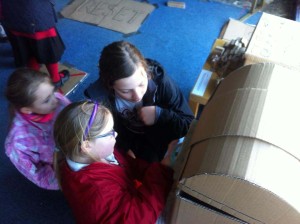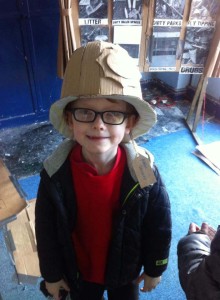Working at Delib, it’s no secret I’m a sucker for consultation and all things digital democracy, but something people may not know is that I’m also an illustrator and passionate about art. So when the two come together, let’s just say it ticks all my boxes!
In February this year, eight Junior Digital Media Producers from Bristol arts charity Knowle West Media Centre (KWMC), were set a challenge to engage their community and encourage community activism. The project was called Data Patchwork and the team’s response to the brief was a fascinating exploration of innovative ways to collect and represent data. One of the outcomes was an exhibit called ‘The Cardboard Living Room.’ As you might glean from the name, the exhibit was a room filled with 3D cardboard furniture, but perhaps less expected is that every piece of furniture was connected to a computer which reacted to movement.
As residents walked around the room playing with objects, their interaction logged answers to survey questions, and in turn triggered reactions from the furniture. The exhibit was part of a survey with an online counterpart, enabling people to have fun engaging with local issues while reflecting on their lifestyle and community perceptions. I was lucky enough to chat with Sammy Payne, one of the eight technical leads on this project, when she recently came into Delib HQ to talk at our Bristol democracy event. She told me a bit about her goals for the project:
‘So much data exists, is held by councils and organisations and is open, but none of it is visualised. So all the data is there but no one sees it because it isn’t digestible. We wanted to use the exhibit to instil a sense of responsibility in residents to act on shared concerns and use the physical interaction of being in the room as a spring board for discussions.’
Sammy, a journalist and photographer by trade, admits to having a naturally political edge (and a bit of a reputation amongst friends as a feminism activist) but this particular project required a technical ability to code, which was far removed from her usual skill set:
‘The project was part of a wider initiative to equip creative people with the skills they need to find creative employment more easily. Nesta set a brief to create a data toolkit and wanted to see community engagement, activism and how an arts charity could use data to deliver these outcomes. Knowle West Media Centre (KWMC) won the bid to deliver this project, and myself and the other seven digital producers [Baylea Hart, David Biddle, Andy Squibbs, Thomas Kirby, Candice Pepperall, Joanna Mitchell and Max Dowding] were given the training we needed to code the survey and realise our vision for the project.’
Hundreds of residents took part in the survey designed to cover real areas of local concern, inspired by genuine insight from a paper survey generated by a local steering group. This is a true example of ground up community engagement – although there was outside funding from organsiations and the council – the concept, execution and participation came entirely from the team and the community the centre inhabits.
‘It was great to to watch people in the room actually interacting with local issues and the living room sparking conversations between neighbours about shared concerns that never would have been voiced or realised as a common interest otherwise. It’s still early days to know if anyone took those conversations forward, but the interaction was definitely valuable to the community and this was a completely ground up process.’
The team are still waiting for the official results from the data analysis, but the conversion rate is expected to be high, specifically for this area. Delib’s own customers run high profile consultation exercises worldwide, and expect between 5% and 10% of visitors to an online consultation to submit a response. At Delib we are more than aware that the success of a consultation hinges not just on its existence, but its promotion. I was interested to chat with Sammy about their approach to promotion and what she credited the high community engagement to:
‘We followed a rule of 3 for this project; People had to see a piece of promotion at least 3 times before it would stick in their head and they would remember or be inspired to take part. Due to the nature of the Knowle West Centre’s strong and long-standing connections with the community, they had experience of this kind of work and could give us insights into what promotion worked best with residents. For example, residents significantly preferred being informed about local events in person as opposed to being emailed or sent a letter. So we knocked on doors, flyered in the streets, contacted youth networks all alongside additional channels such as videos and social media.’
This multi-faceted approach to promotion, the sheer creativity and uniqueness of the project, and the opportunity for residents to have fun while participating in more serious wider issues, are all reasons this survey caught the eyes and hearts of Bristol.
Working at Delib, I love seeing the inspiring ways our customers combine the technology we provide and their imaginations to run consultations that change lives in small, but significant ways. The Cardboard Living Room is a fantastical, Alice in Wonderland-esque experiment into the endless potential of people when they are engaged and inspired to take action. I believe this is the future of democracy and with more experimentation, fun, creativity, technology (and possibly cardboard furniture)…who knows what can people and communities can make happen.



